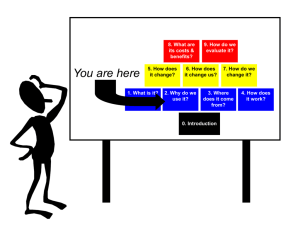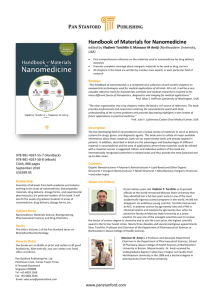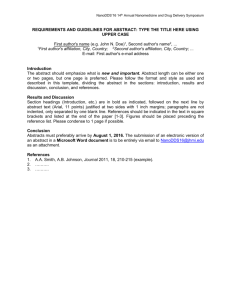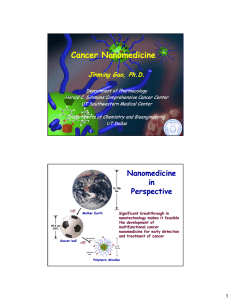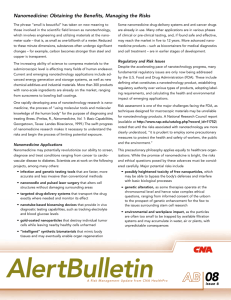ABSTRACT: 2015 ELATE Institutional Action Project Poster Symposium Project Title: Collaborators:
advertisement
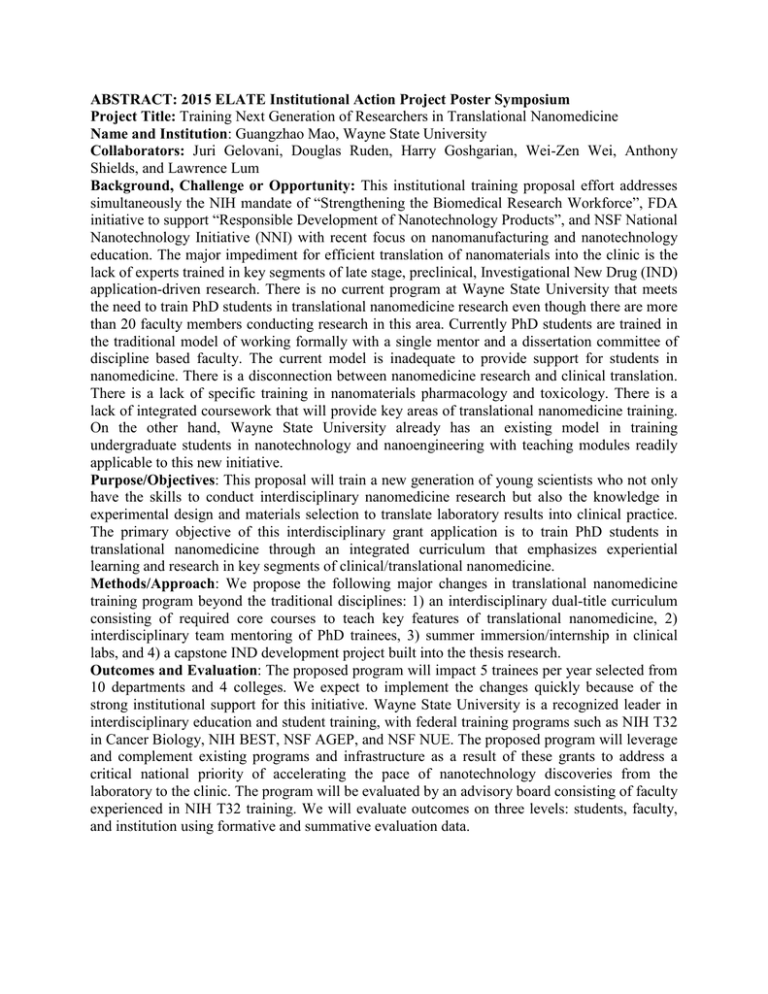
ABSTRACT: 2015 ELATE Institutional Action Project Poster Symposium Project Title: Training Next Generation of Researchers in Translational Nanomedicine Name and Institution: Guangzhao Mao, Wayne State University Collaborators: Juri Gelovani, Douglas Ruden, Harry Goshgarian, Wei-Zen Wei, Anthony Shields, and Lawrence Lum Background, Challenge or Opportunity: This institutional training proposal effort addresses simultaneously the NIH mandate of “Strengthening the Biomedical Research Workforce”, FDA initiative to support “Responsible Development of Nanotechnology Products”, and NSF National Nanotechnology Initiative (NNI) with recent focus on nanomanufacturing and nanotechnology education. The major impediment for efficient translation of nanomaterials into the clinic is the lack of experts trained in key segments of late stage, preclinical, Investigational New Drug (IND) application-driven research. There is no current program at Wayne State University that meets the need to train PhD students in translational nanomedicine research even though there are more than 20 faculty members conducting research in this area. Currently PhD students are trained in the traditional model of working formally with a single mentor and a dissertation committee of discipline based faculty. The current model is inadequate to provide support for students in nanomedicine. There is a disconnection between nanomedicine research and clinical translation. There is a lack of specific training in nanomaterials pharmacology and toxicology. There is a lack of integrated coursework that will provide key areas of translational nanomedicine training. On the other hand, Wayne State University already has an existing model in training undergraduate students in nanotechnology and nanoengineering with teaching modules readily applicable to this new initiative. Purpose/Objectives: This proposal will train a new generation of young scientists who not only have the skills to conduct interdisciplinary nanomedicine research but also the knowledge in experimental design and materials selection to translate laboratory results into clinical practice. The primary objective of this interdisciplinary grant application is to train PhD students in translational nanomedicine through an integrated curriculum that emphasizes experiential learning and research in key segments of clinical/translational nanomedicine. Methods/Approach: We propose the following major changes in translational nanomedicine training program beyond the traditional disciplines: 1) an interdisciplinary dual-title curriculum consisting of required core courses to teach key features of translational nanomedicine, 2) interdisciplinary team mentoring of PhD trainees, 3) summer immersion/internship in clinical labs, and 4) a capstone IND development project built into the thesis research. Outcomes and Evaluation: The proposed program will impact 5 trainees per year selected from 10 departments and 4 colleges. We expect to implement the changes quickly because of the strong institutional support for this initiative. Wayne State University is a recognized leader in interdisciplinary education and student training, with federal training programs such as NIH T32 in Cancer Biology, NIH BEST, NSF AGEP, and NSF NUE. The proposed program will leverage and complement existing programs and infrastructure as a result of these grants to address a critical national priority of accelerating the pace of nanotechnology discoveries from the laboratory to the clinic. The program will be evaluated by an advisory board consisting of faculty experienced in NIH T32 training. We will evaluate outcomes on three levels: students, faculty, and institution using formative and summative evaluation data. Training the Next Generation of Researchers in Translational Nanomedicine Guangzhao Mao Professor of Chemical Engineering and Materials Science Wayne State University Detroit, Michigan 48202 Purpose and Objectives Challenge and Opportunity Major federal research initiatives NIH “Strengthening the Biomedical Research Workforce” FDA “Responsible Development of Nanotechnology Products” NSF National Nanotechnology Initiative Fewer than 100 nanomedicine products despite rapid advances in basic science Impediment: lack of experts trained in key segments of translational nanomedicine More than 20 faculty groups but no formalized curriculum in nanomedicine at WSU Background Nanotechnology: the understanding and control of matter at the nanoscale (1-100nm) Nanomedicine: a branch of nanotechnology offering nanoscale medical interventions for curing disease or repairing tissues Nano-device for targeted drug delivery to spinal cord Nano-film for programmable gene delivery Strong interdisciplinary research in nanoengineering and nanomedicine at WSU Train graduate students in translational nanomedicine research Interdisciplinary dual title curriculum consisting of required courses to teach key features of translational nanomedicine Interdisciplinary team mentoring of PhD trainees Summer immersion/internships in clinical labs Capstone Investigational Drug Development (IND) project built into the thesis research Methods and Approach Our results: T32 grant, program establishment, enrollment, reputation Expected Outcome and Assessment Activities: Admission to the program Required and elective courses Summer clinical immersion Thesis research advised by a mentoring team Capstone IND project Training outcomes: Ability to conduct translational research Earning a dual title PhD degree Program outcomes: Increased research productivity Improved student enrollment and employment Accelerated research translation Conclusion Stakeholder results: training model attractive to NIH, support/jobs for students, societal benefits WSU will become the leader in training the next generation of scientists in translational and clinical nanomedicine. Core processes: team mentoring, dual title, capstone projects, clinical immersion Mentors and Collaborators Organizational capabilities: NIH-funded faculty, clinical collaborators, infrastructure, curriculum Discussion Preliminary results and progress: Nanomedicine, 2013, 9, 1-14. Presented at the 2015 ELATE® Leaders Forum Identified key components Collected demographic data on student training Assembled core faculty mentoring team Applied and received internal support Anticipated impact: 20 faculty members 10 departments 4 colleges Community Society Farshad Fotouhi, Dean, College of Engineering, Professor of Computer Science, Wayne State University Gloria Heppner, Associate Vice President for Research, Wayne State University Larry Matherly, Director, NIH T32 Cancer Biology Graduate Program, Wayne State University Juri Genovani, Professor and Chair, Department of Biomedical Engineering, Wayne State University Acknowledgments http://www.cafepress.com Lorrie Cranor, Carnegie Mellon U. Dan Jiao, Purdue U. Borjana Mikic, Smith College Laura Ray, Dartmouth U. Risa Robinson, RIT Margaret Wheatley, Drexel U. For feedback and support
